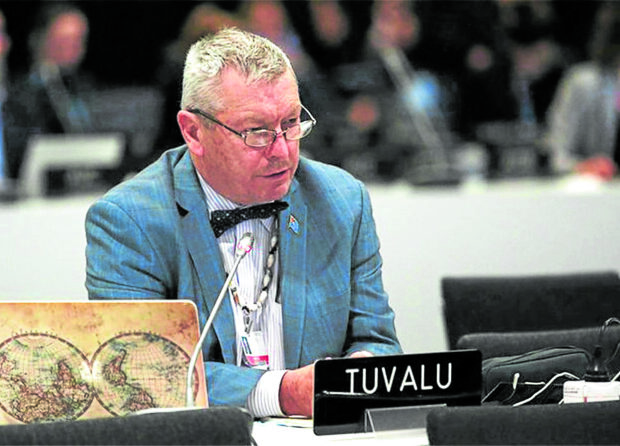UN rapporteur to PH: Repeal anti-terror law, abolish anti-communist task force

Ian Fry —PHOTO FROM THE OFFICE OF THE HIGH COMMISSIONER FOR HUMAN RIGHTS WEBSITE
United Nations Special Rapporteur Ian Fry urged the government on Wednesday to revoke the Anti-Terrorism Act and abolish its anticommunist task force, noting how both were facilitating human rights violations and the harassment of environmental defenders.
“The government needs to create a clean slate around its approach to antiterrorism and revise the laws to make them appropriate for the circumstances occurring now, and not to use the laws to harass, vilify and kill environmental human rights defenders,” Fry said in a press briefing.
The international environmental law and policy expert spoke on the last day of his 10-day visit to the country to study and identify how the adverse impacts of climate change were affecting the “full and effective enjoyment of human rights.”
Citing “horrific stories” from civil society groups and indigenous peoples (IPs) organizations who were subjected to attacks, he suggested that the government disband the National Task Force to End Local Communist Armed Conflict (NTF-Elcac) “because it … is operating beyond its original mandate and is Red-tagging people from the community.”
Fry said that during his consultations, he heard testimonies from civil society organizations and even church leaders who were attacked, Red-tagged and their assets ordered frozen—actions by the military which the UN expert said were “totally unreasonable.”
He stressed the need to investigate previous NTF-Elcac operations in addition to reported cases of extrajudicial killings.
Fry also recommended the formulation of a truth and reconciliation process, noting that “there [were] clearly people who suffered dramatically as a consequence of the persecution of environmental rights defenders and there needs to be a process to properly review the effects of the actions of the military.”
The National Commission on Indigenous Peoples, he added, must be reformed, as he suggested the establishment of a grievance mechanism to hear the harm that IPs suffered due to “inappropriate” development projects and military action.
Fry noted that the country was “under a lot of pressure” to provide to the international economy minerals like lithium, cobalt, nickel and gold in support of renewable energy initiatives.
In turn, the opening of more mines led to more human rights violations such as displacement of IPs and serious contamination of river systems, resulting in reduced water supply for affected communities, he said.
Fry’s other recommendations included the enforcement of a moratorium on all reclamation projects in the country and the revision of the Climate Change Act.
“The government needs to take strong heed of the Commission on Human Rights’ Report on climate change and hold ‘carbon majors’ accountable for the greenhouse gas emissions they are responsible for,” he said in his interim report.
Fry will present his formal report to the UN Human Rights Council in June 2024, which will provide feedback to the government through communication or exchange of letters.
He added that while it was still up to the government to heed the recommendations, failure to do so would have its “biggest impact” on the country’s international image.